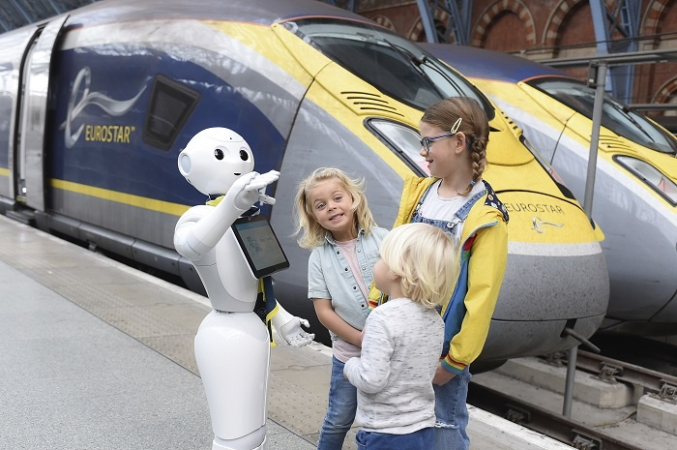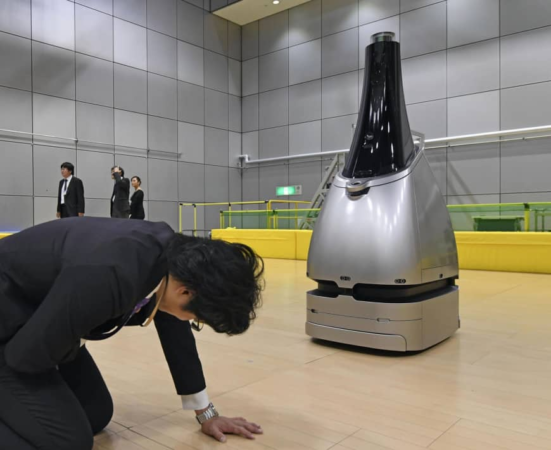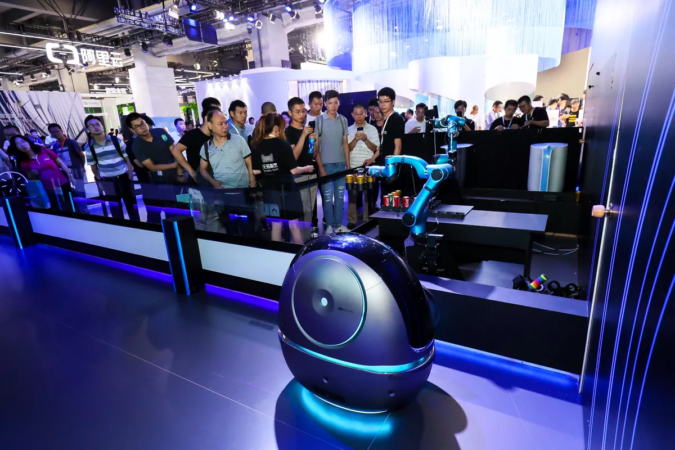These Robots Have Serious Travel Industry Potential
Ah, robots. We meet again. For an industry so reliant on customer service and authenticity, you'd think travel companies would steer clear of employing too many non-human workers.
But no, the race to innovate never stops. Particularly when adaptable robots can provide easy customer service, free labour and, in some cases, an extra security measure.
Here are three travel industry robot stories that have caught our eye in the past few months.
Meet Eurostar’s newest recruit: Pepper the robot

If you’ve ever dared to venture out into the world and use the trains in a major city, you’ll know how easy it is for your well-organised plans to be derailed. Particularly if you’re planning to travel between countries in Europe.
Racing to get to the train on platform 3, travellers can often realise too late that a grave mistake has been made. Platform 3 does not have the train they thought it did. If only things could be made easier. If only things could be more accessible.
Well, high-speed rail operator Eurostar is aiming to make that a reality. The solution? Robots.
When we talk about robots, it’s easy to think about a huge warehouse. Thousands of machines crammed in doing the same monotonous task over and over again. On the plus side, they never need to stop for a toilet break. On the downside, they’re not known for their people skills.
Few robots are known for their approachable personalities. Most are more likely to calculate the chances of you having a good morning than say ‘good morning’.
Eurostar is aiming to break that stigma with Pepper, a humanoid robot made by SoftBank robotics.
Read more: Report Digs in to Travel Technology Trends for 2018
Pepper enters the fray
The train company, which connects the UK to cities in mainland Europe, is introducing Pepper to give travellers information and assistance.
London’s St Pancras is the first station to host the new Eurostar scheme. Pepper will give information on train times, platforms, prices, and more. Eurostar hopes that technology on platforms will improve their customers' experience.
A customer service agent that’s always happy to serve?
Pepper has an in-built tablet that lets customers access an interactive map of St Pancras station to more easily find their platform. It also includes train-specific information to give customers an idea of what’s to come on their Eurostar service.
Pepper uses a camera, microphone and no small amount of computing power to help it understand different facial expressions, speech and even body language. The ability to adapt to your behaviour could enable Pepper to respond to even the trickiest of customer situations. And if you for some reason are not in a rush you can even take a selfie with Eurostar’s new recruit.
For many travellers, the idea of getting journey information and advice from a robot might be a strange one. But the European rail giant believes this is a step that will raise the bar for customer satisfaction, as well as providing customers with young children extra entertainment on the platform.
Eurostar’s head of digital, Perrine Allain, said, “We are always looking for new ways to innovate, and explore technologies that can help enhance the overall customer experience.
“Pepper offers a fun way for customers to find out more about their journey and destination, and we look forward to hearing the feedback from our customers so that we can continue to improve their experience.”
Eurostar is launching the Pepper pilot at St Pancras to begin with. The company has confirmed plans to move the robot to another of their destinations in the new year.
Read more: Artificial Intelligence Will Change the Travel Industry Forever
Robot security guard to patrol Tokyo station for Olympic Games

Another robotic train station assistant has been unveiled - this time in Japan’s capital of Tokyo. But this one is focused on security rather than customer service.
Perseusbot is the joint creation of the Tokyo Metropolitan Industrial Technology Research Institute, Seibu Railway Co, IT firm Nihon Unisy, and AI computer vision developer, Earth Eyes. The robot is due to join Japanese railway staff in 2020 for the Olympic and Paralympic games.
The project is being implemented to help preserve the peace and ease the burden on security staff during what will be a busy time for Japan’s capital.
With terror attacks on the rise around the world and tensions heightened at large-scale public events, Perseusbot will form part of additional security measures at the Tokyo Olympic Games.
Read more: How to Choose a Travel Marketplace Niche
A robot to protect and serve
Perseusbot is 167.5 centimetres tall. Its aim will be to assist railway staff once the games begin. The robot will patrol station platforms and combine security camera footage with an onboard AI to detect and report suspicious people or objects.
Perseusbot will also send alerts to the smartphones of security guards. It’s being trained to recognise items that have been left unattended and aggressive movements made by travellers.
Earth Eye’s AI technology has been used in the past to spot shoplifters. The company website explains how the technology can be used alongside video feeds as a security measure, to “detect and notify suspicious behaviour as soon as possible… it shows the deterrent effect of preventing crime in advance.”
The team responsible for the robot will need to be careful that prejudice and bias don’t infect the AI’s training data. We’ve seen that happen before, most notably with Microsoft’s ‘Tay’ - arguably the most dramatic example of AI gone bad.
The bot was connected to social network Twitter to learn through conversation with the public in order to learn from its interactions. However, it ended up being taken down after a number of inappropriate tweets.
Clearly, Tay lacked the neutral input required for its training data and was quickly shut down by an embarrassed Microsoft. With Perseusbot the risks are higher.
This is the real world and the diplomatic costs of racial profiling, for example, could be significant. If the system is predicated on biased training data, the AI could pick up some bad habits and do more harm than good in 2020.
Alibaba’s Space Egg steps up to the plate

Alibaba is also entering the domain of robot customer service. But this time our mechanical friends won’t be assisting travellers in a train station, they’ll be rolling around hotel corridors instead.
Alibaba’s ‘Space Egg’ offers a glimpse into the future, one in which human porters are obsolete and replaced by indefatigable AI-powered robot servants. The Space Egg was revealed in mid-September in Hangzhou, China before being put to work in October at a hotel in the same city.
On the face of it, the Space Egg has been designed to replace traditional porters and represents the latest step in the hotel industry’s bid to automate roles previously occupied by human workers.
But Alibaba says the robot can take over menial tasks, trundling room service from the kitchen to guests’ bedrooms, for example, allowing staff more time to spend on keeping guests happy.
How do you like your eggs in the morning?
The Space Egg works by connecting to the hotel’s Wi-Fi network, the kitchen and a dynamic ordering system. It receives an order from a smart device found in each guest’s room.
The robot then knows where to collect it from - usually the kitchen - and how to navigate around the hotel. The Space Egg uses built-in directional lasers to communicate its intentions and moves around while avoiding obstacles and people. It can even tap into the hotel's Wi-Fi network to open elevators, and has facial recognition software that enables it to make small talk with travellers.
The rollout promises to take the jobs of low-skilled hotel staff, which could, in turn, maximise the profits of hotels and improve efficiency - something that’s been the driving force behind projects like Japan’s Henn-Na, a hotel entirely staffed by robots.
Lijuan Chen of Alibaba AI Labs stated that the robot will “bridge the gap between guest needs and the response time that they expect. The robot will be the ultimate assistant for hotel guests who want everything quickly and conveniently at their fingertips.”
Final Thoughts
So there you have it: rail operators, hotels and transport authorities around the world are exploring how robots can improve and, in some cases, protect, the travel experience.
Which is an interesting concept. You'd normally associate brands like Eurostar and any traditional hotel with an appreciation of the value of human contact. It's often the little things, the friendly words and small gestures, that make a trip memorable and help to instil that sense of loyalty.
But ultimately the benefits of robotics can't be overlooked. Whether that's in terms of performance: a robot that can recognise crowd safety issues in a flash; or through relentless drive: the ability the provide customer service and intra-hotel delivery without sleep, food or pay.
Perhaps the wave of travel industry robots is just a matter of time.